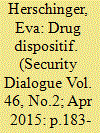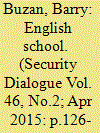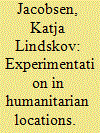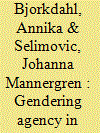| Srl | Item |
| 1 |
ID:
138072


|
|
|
|
|
| Summary/Abstract |
International relations and critical security studies are increasingly including the role of materiality in the study of security practices, inquiring into how objects act as both threat and /or endangered referent. However, objects of ‘dual-use’ – that is, objects that are not only threatening or in need of protection but also beneficial or pleasurable to the human collective – figure less prominently. Drugs are such an ambivalent matter: beneficial in the context of medicine and at the same time threatening in the context of crime. Mobilizing the concept of the dispositif, this article questions how drugs and addiction materialize in the practices of the global drug prohibition regime. I argue that the ambivalence of the material object ‘drug’ is the condition of possibility of the regime. The regime as an epitome of the ‘drug dispositif ’ illustrates how ambivalent objects give rise to expanding security practices and specific power relations, highlighting how (critical) security analyses could profit from greater awareness of ambivalent matters.
|
|
|
|
|
|
|
|
|
|
|
|
|
|
|
|
| 2 |
ID:
138069


|
|
|
|
|
| Summary/Abstract |
The terms ‘English School’ (ES) and ‘international security’ seldom appear in the same sentence. Yet the ES can and should constitute a general approach to International Security Studies (ISS) comparable to realism, liberalism, constructivism and several other approaches to International relations (IR). The article begins by sketching out how the ES’s idea of raison de système provides a general framing for ISS that counterpoints approaches focused on raison d’état. It then shows how the ES’s societal approach provides specific insights that could strengthen analysis of international security: by providing a normative framing for securitization; by showing the historical variability of key ISS concepts such as war, balance of power and human rights; by adding an inside/outside dimension to security relations based on differentiations within international society; and by complementing regional approaches to international security with its societal approach. The article aims to initiate a conversation between the ES and ISS by showing where the fruitful links are, and by introducing the relevant ES literature to ISS scholars.
|
|
|
|
|
|
|
|
|
|
|
|
|
|
|
|
| 3 |
ID:
138070


|
|
|
|
|
| Summary/Abstract |
Amid good intentions, such as providing humanitarian assistance to refugees, the use of biometric technology in humanitarian refugee management may entail various risks for the implicated refugee populations. Drawing on insights from science and technology studies, this article introduces a distinction between risks stemming from technology failure and risks stemming from successful uses of biometric technology. The article thus departs from the literature in which technology failure has been in focus by showing that analysing the effect of technology success adds an important dimension to our analysis of the range of risks that may emerge in the context of humanitarian technology uses. The usefulness of this distinction is then illustrated through an analysis of the use by the United Nations High Commissioner for Refugees (UNHCR) of iris recognition in the repatriation of Afghan refugees; besides risks of failure at the implementation stage, risks also emerged once refugees had successfully registered their biometric data with UNHCR. To recognize how humanitarian refugee biometrics produces digital refugees at risk of exposure to new forms of intrusion and insecurity, we need to appreciate how successful technology can have critical implications arising from how technology is constituted in and constitutive of social phenomena.
|
|
|
|
|
|
|
|
|
|
|
|
|
|
|
|
| 4 |
ID:
138071


|
|
|
|
|
| Summary/Abstract |
Mainstream transitional justice and peacebuilding practices tend to re-entrench gendered hierarchies by ignoring women or circumscribing their presence to passive victims in need of protection. As a consequence we have limited knowledge about the multifaceted ways women do justice and build peace. To address this lacuna we conceptualize and unpack the meaning of gendered agency, by identifying its critical elements and by locating it in space and in time. The conceptual work that we undertake is underpinned by empirical mapping of the transitional justice spaces in post-conflict Bosnia-Herzegovina, where we point out instances of critical, creative, and transformative agency performed by women that challenge or negotiate patterns of gendered relations of domination. We collect women’s oral narratives and explore new sets of questions to capture women’s unique experiences in doing justice. Such research enables us to engage with the subjects of post-conflict peacebuilding and transitional justice processes directly and in their own spaces. This article thus renders women’s agency visible and attempts to grasp its contributions and consequences for transformations from war to peace.
|
|
|
|
|
|
|
|
|
|
|
|
|
|
|
|
| 5 |
ID:
138068


|
|
|
|
|
| Summary/Abstract |
This article compares security dynamics at two Olympic Games hosted by Canada: Montreal (1976) and Vancouver (2010). It is the first study of security at the Montreal Olympics and was only made possible after four years of requests under the Access to Information Act that resulted in the release of thousands of classified security documents in French and English. A comparative study of the two largest peacetime security operations in Canadian history offers unique insights into the challenges of hosting a major international gathering in the aftermath of an international terrorist incident: the 1972 Munich massacre and the 11 September 2001 attack on the World Trade Center. The comparison further offers an opportunity to chart the continuities and differences in Olympic security over time. We focus in part on how the historical context of each event informed ‘imaginaries of disaster’. We also examine continuities in the official security response, such as the emphasis on advance intelligence gathering, security ‘mock-ups’, manpower allocation, coalitions of security agencies and technological innovation. We conclude with some considerations on security legacies and the importance of major event security as a subject of comparative inquiry.
|
|
|
|
|
|
|
|
|
|
|
|
|
|
|
|